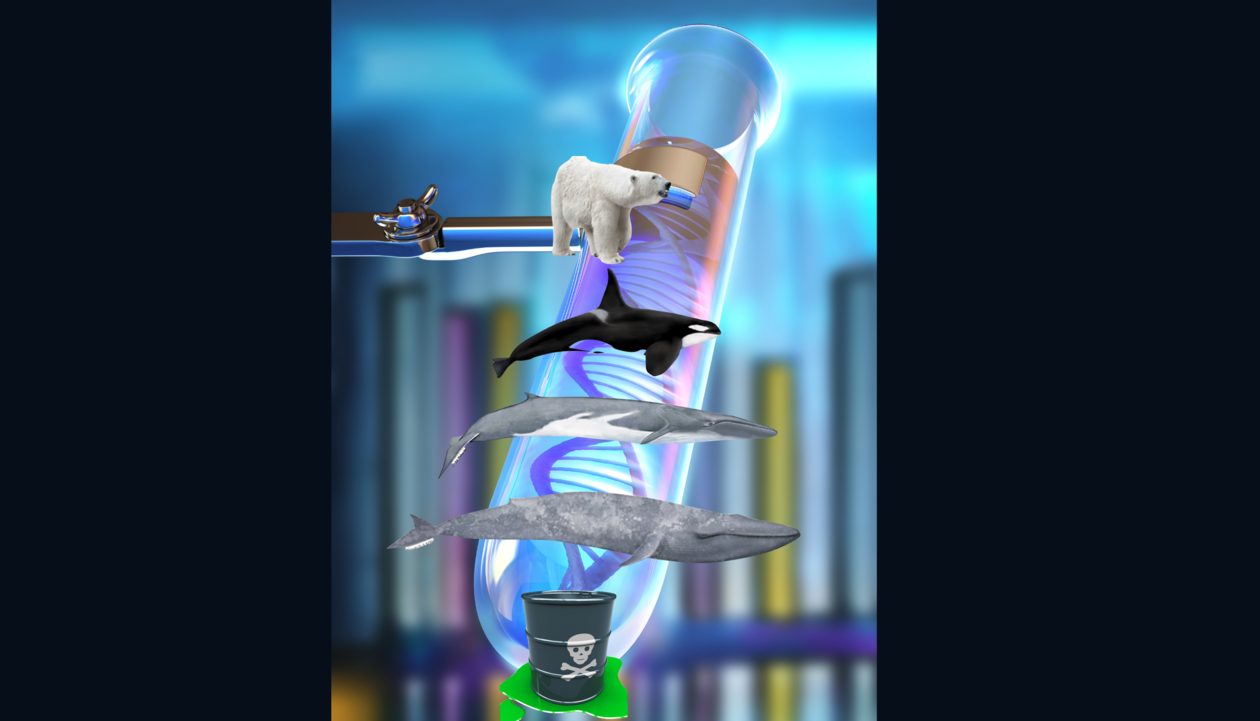Marma-detox
Whales and polar bear in a petri dish: decoding marine mammal toxicology through in vitro and in silico approaches

Main content
Large marine mammals play an important role in marine ecosystems as top predators. Unfortunately, their high energy intake also means they accumulate high levels of contaminants that can affect their health and act as indicators of environmental pollution. Orcas are the most contaminated marine mammal species due to their position as top predators, while baleen whales have lower levels of pollutants since they are filter feeders. These contaminants can disrupt animal physiology, growth, and reproduction, as well as immune function and overall health.
To better understand how these contaminants affect marine mammals, researchers have been working on developing new methods to study them. By using in vitro and in silico methods, they can study the effects of environmental contaminants on key molecular targets in animals like orcas, fin whales, and polar bears. Additionally, they can establish fibroblast cell cultures from skin-blubber biopsies that can be used to study toxicological responses in these animals. This research is crucial in helping us monitor and mitigate the impact of pollutants on marine mammals and the wider environment.
The Marma-detox project
Marma-detox will provide key knowledge about the effects in marine ecosystems of contaminants which are not yet under regulatory norms. This information will be highly valuable for evaluation of which CECs should be regulated at national/international level (e.g Stockholm Convention). Thus, our results will potentially prohibit the use and production of hazardous chemicals. Our results will also be of importance for management of vulnerable marine mammal species (or their habitats) as we will be able to predict risk for contaminant effects in species that are very challenging subjects for contaminant effect studies. The Marma-detox project is tightly aligned with the Ocean Decade, as it will provide key knowledge about the effects of contaminants to marine ecosystems, and especially to marine mammals. The project will actively engage in the Ocean Decade and will propose Decade Actions, Decade Activities and engage in Communities of Practice.
The Marma-detox project is furthermore highly relevant for several UN Sustainable Development Goals (SDGs). Knowledge generated in the project is especially relevant for SDG14 to better "protect marine and coastal ecosystems to avoid significant adverse impact" (Target 14.2); and also for Target 14.1 to "prevent and significantly reduce marine pollution of all kinds". It will contribute to SDG12 to "achieve the environmentally sound management of chemicals in accordance with agreed international frameworks, and significantly reduce their release in order to minimize their adverse impacts on human health and the environment" (Target 12.4), and, in fine, to update the current "data deficient" conservation status of Orcas in the IUCN red list, highly relevant for SDG15 to "take urgent and significant action to halt the loss of biodiversity" (Target 15.5). Finally, this project will connect researchers from four countries on two continents, and will attract students from other regions, enhancing "the global partnership that mobilize and share knowledge, expertise, technology and financial resources, to support the achievement of the sustainable development goals" (SDG17, Target 17.16).
The Marma-detox project is supported by the Arctic Monitoring and Assessment Programme (AMAP), a transnational working group under the Arctic Council, which plays an important role in assembling and communicating science-based knowledge on pollution in the Arctic to decision makers, both at national and international levels. AMAP, the Norwegian Environment Agency, and The Whale (a newly established science centre to communicate knowledge about whales and their environment through science and art, see thewhale.no), will represent different stakeholders in our Reference Group, ensuring a direct contact in the project with organizations involved in the management and communication of issues related to the marine and Arctic environment in general, and to whales in particular. The Norwegian Polar Institute partners in the project are also heavily involved in management processes related to vulnerable species of marine mammals in Norwegian Seas (e.g., Circumpolar and national management of polar bears, management of the Barents Sea).
Academic ambition
The Marma-detox project will open new horizons for marine mammal biology, toxicology, conservation, and other aspects of the evolutionary and individual adaptations of these animals. This research could help to better understand effects of contaminants on population dynamics and help the resurgence of these large and important animals. Our approaches and techniques may also be translated to other threatened and under-studied wildlife in environmental toxicology. We will strive to make cell lines established available to other researchers and other disciplines. As mentioned, our project will contribute to genome information and annotations useful to the Earth Biogenome Project70, through the Norwegian EBP Consortium. By establishing a consortium of Norwegian, Portuguese, Spanish, and US scientists, we will contribute to the training of young scientists as MSc and PhD students in an interdisciplinary environment through workshops, seminars, and mobility across North and South Europe and the Atlantic to North America.
The holistic and interdisciplinary approach of the Marma-detox project, integrating field data, experimentation (in vitro/ex vivo) and modelling (in silico) of toxicant impact of large marine mammals, make this project bold and novel. Such a mix will serve as a fertile ground to provide comprehensive understanding about how chemical pollution may impact the elusive, large marine mammals. Our research team in the Marma-detox project is uniquely positioned to contribute significantly to understanding the toxicological responses of marine mammals, both experimentally and computationally. Our novel approaches and combination of expertise and disciplines make us a driving force in the investigation of these important, yet under-studied animals. Furthermore, the insights gained in the project will provide a deeper understanding of the evolutionary processes and adaptations leading to the specializations found in these animals, some of which inhabit extreme environments in polar and marine regions. Marma-detox also aims to contribute to genome information and annotations useful to the Earth Biogenome Project (EBP70), through the Norwegian EBP Consortium (funded through NFR).


